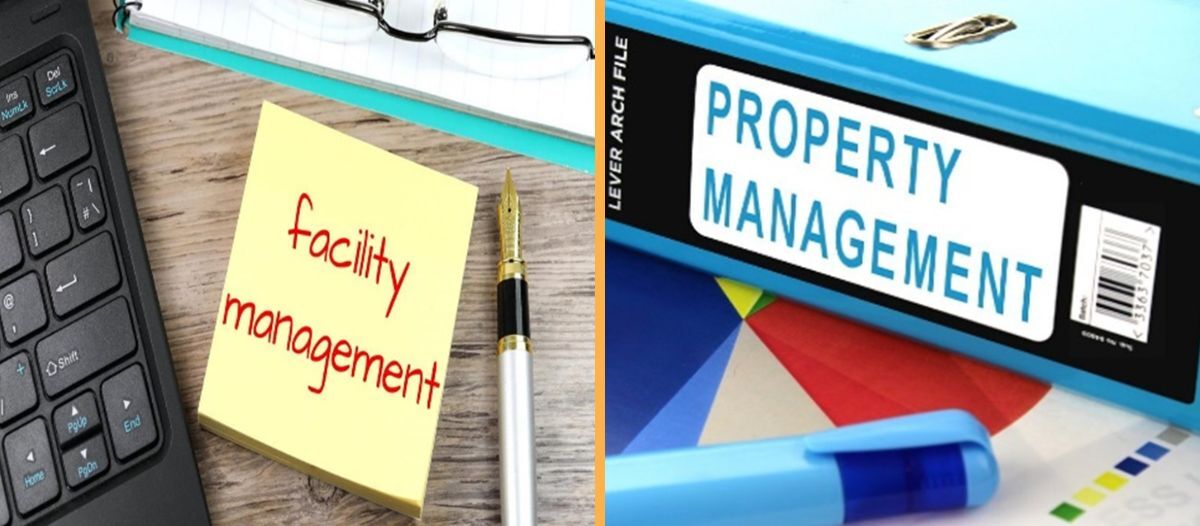Facility Management vs. Property Management
Understanding the differences

Facility management and property management are two essential aspects of real estate and building operations. While they share some similarities, they serve different purposes and involve distinct responsibilities. Understanding these differences can help both facility and property managers optimize the functionality and value of their buildings and infrastructure.
Facility management
FM is all about ensuring buildings run smoothly and are comfortable for the people who use them. FMs oversee the day-to-day operations, making sure everything works as it should. Here are some real-world examples of what they do:
-
Maintenance & repairs: Imagine a school where the FM ensures the HVAC system is working so classrooms stay warm in winter and cool in summer. They also oversee plumbing issues, electrical repairs and general upkeep to prevent any disruptions to the learning environment. Regular maintenance checks and prompt repairs are crucial to avoid any major breakdowns that could disrupt daily activities.
-
Safety & security: In a hospital, the FM team might install and maintain security cameras and alarm systems to keep patients and staff safe. They also conduct regular safety drills and ensure all fire safety equipment is up to date and functioning properly. This includes managing access control systems to ensure only authorized personnel can enter sensitive areas.
-
Space management: At a corporate office, FMs might rearrange office layouts to create more collaborative spaces. They also manage conference room bookings and ensure that shared areas are well-maintained and conducive to productivity. Effective space management can lead to improved employee satisfaction and higher productivity levels.
-
Vendor management: In a shopping mall, FMs coordinate with cleaning services and maintenance crews to keep the place spotless. They also negotiate contracts with vendors to ensure that services are provided efficiently and cost-effectively. This involves regular performance reviews and ensuring that vendors meet the agreed-upon standards.
-
Sustainability: At a university, FMs might implement recycling programs and energy-saving initiatives to reduce the campus’ environmental footprint. They also work on projects like installing solar panels or upgrading energy-efficient lighting systems to promote sustainability. These initiatives not only help the environment but can also lead to significant cost savings over time.
-
Event management: In a convention center, FMs coordinate the setup and teardown of events, ensuring that all technical and logistical aspects are overseen smoothly. This includes managing audio-visual equipment, seating arrangements and catering services to ensure a successful event.
-
Custodial services: In an office building, FMs oversee cleaning crews to maintain a clean and hygienic environment. This includes managing waste disposal and ensuring that restrooms and shared areas are regularly sanitized. A clean environment is essential for the health and well-being of occupants.
-
Landscaping & grounds maintenance: At a hotel, FMs ensure that the gardens and outdoor areas are well-maintained, creating a pleasant environment for guests. This includes regular mowing, planting, and maintenance of outdoor furniture and fixtures.
-
Emergency & disaster management: In a data center, FMs develop and implement emergency response plans to protect the facility and its occupants in case of natural disasters or other emergencies. This includes regular drills and ensuring that all emergency equipment is in working order.
-
Technology integration: In a modern office building, FMs might oversee the integration of smart building technologies, such as automated lighting and climate control systems. These technologies can enhance the efficiency and comfort of the building while reducing operational costs.
-
Health & wellness programs: In a corporate setting, FMs might implement health and wellness programs, such as ergonomic furniture and wellness rooms, to support the well-being of employees. These programs can lead to increased employee satisfaction and productivity.
FM creates a great environment for the people who use the building. It is a people-centric field that focuses on enhancing the experience of occupants and ensuring that the building operates efficiently.
Property management
PM focuses on the financial and administrative side of property ownership. PMs function as the go-between for property owners and tenants, handling things like leasing and rent collection. Here are some real-world examples:
-
Tenant management: In a residential apartment complex, PMs screen potential tenants, handle lease agreements and address tenant complaints. They also organize events to foster a sense of community among residents and oversee any disputes that may arise. Effective tenant management can lead to higher tenant retention rates and a more stable income for property owners.
-
Financial management: For a commercial office building, PMs collect rent, manage budgets and ensure the property is profitable. They also prepare financial reports for property owners and make recommendations for cost-saving measures or potential investments. Fiscal management is crucial for maintaining the financial health of the property and ensuring its long-term viability.
-
Legal compliance: In a retail center, PMs ensure the property complies with local zoning laws and safety regulations. They stay updated on changes in legislation and ensure that the property adheres to all legal requirements, including health and safety standards. Compliance with legal regulations is essential to avoid fines and legal issues.
-
Maintenance oversight: PMs might work with the FM team to oversee repairs and maintenance, ensuring everything is up to codes and standards. They also schedule regular inspections and preventive maintenance to avoid costly repairs in the future. Effective maintenance oversight can lead to lower operational costs and higher tenant satisfaction.
-
Property marketing: For vacation rentals, PMs promote the properties online to attract guests and keep occupancy rates high. They also manage online reviews and ensure that the property is presented in the best possible light to potential renters. Effective marketing can lead to higher occupancy rates and increased revenue for property owners.
-
Lease negotiations: In a commercial property, PMs negotiate lease terms with tenants to ensure favorable conditions for both parties. This includes setting rental rates, negotiating lease duration and addressing any unique requirements tenants may have.
-
Tenant retention programs: In a residential complex, PMs might implement tenant retention programs, such as loyalty rewards or referral bonuses, to encourage tenants to stay long-term. These programs can lead to higher tenant satisfaction and lower turnover rates.
-
Property inspections: PMs conduct regular inspections to ensure that the property is well-maintained and that tenants are adhering to lease terms. This includes checking for any damage, ensuring cleanliness and addressing any issues promptly.
-
Conflict resolution: PMs oversee conflicts between tenants or between tenants and property owners. Effective conflict resolution can lead to a more harmonious living or working environment and prevent disputes from escalating.
-
Market analysis: PMs conduct market analysis to determine competitive rental rates and identify opportunities for property improvement or investments. This helps property owners make informed decisions and maximize their returns.
PM maximizes the value and profitability of the property. It is a building-centric field that focuses on the financial health of the property and maintaining good relationships with tenants.
Key differences
While both FM and PM are crucial for the smooth operation of buildings, they differ in several key areas:
-
Focus: FM is focused on the operational aspects and the well-being of occupants, while PM is focused on the financial and administrative aspects of property ownership.
-
Responsibilities: FMs oversee the day-to-day operations and maintenance of the building, whereas PMs oversee tenant relations, leasing and fiscal management.
-
Goals: The primary goal of FM is to create a functional and comfortable environment for occupants, while the primary goal of PM is to maximize the property's value and profitability.
FM and PM are distinct yet complementary fields. FM ensures that buildings operate efficiently and meet the needs of occupants, while PM focuses on the financial and administrative aspects of property ownership. Understanding the differences between these two fields is crucial for optimizing the functionality and value of buildings and infrastructure.
Both teams play vital roles in the real estate industry. By recognizing the unique contributions of each field, property owners and managers can create environments that are both functional and financially successful. Understanding these differences can help make informed, strategic decisions.

Steven Stierstorfer is a director of facilities and security, overseeing daily global facility management. His role involves developing strong relationships with vendors to reduce costs and improve response times for issue resolution. Stierstorfer led and coordinated the global standardization of predictive maintenance, scope of work, security CCTV and badge access systems, enhancing FM to ensure asset longevity. He is responsible for the creation and ongoing maintenance of his company's business continuity/disaster recovery and emergency response plans. His technical expertise includes managing global data centers, ensuring adherence to methods of procedure (MOPs), and maintaining critical equipment such as UPS, generators, HVAC systems, FM200 and fire alarm systems.
Read more on Leadership & Strategy and Performance & Quality or related topics Problem Solving and Occupant Services
Explore All FMJ Topics








